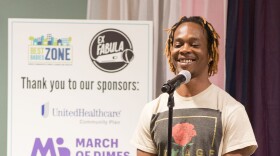In Season 2 of Swing State of the Union, we’re going to court – the Wisconsin Supreme Court.
In a politically divided Wisconsin, major decisions about issues like gerrymandering, abortion and union rights come down to the seven justices on the state Supreme Court.
This April, Wisconsin will elect a new Supreme Court justice, likely deciding the ideological balance of power.
But why do we elect Supreme Court justices? And what does it say when partisan politics take center stage during these supposedly nonpartisan races?
We’ll learn how the court system works in Wisconsin and the Supreme Court’s role in state politics.
“The court's responsibility is primarily to answer questions of law that have statewide significance, to resolve either novel or recurring questions, and to provide clarity about what state law means,” says Miriam Seifter, professor of law at UW-Law School and codirector of the State Democracy Research Initiative.
We’ll examine how the court has developed over the past 30 years, and the increasing role of partisan politics.
“You know you're never gonna fully escape the influence of things like politics and, I think law, you know, sort of floats in a sea of politics and norms and customs and all these sorts of things. You can't get away from it entirely. But I think that that doesn't mean you have to give into it completely,” says Chad Oldfather, professor of law at Marquette University Law School and author of Judges, Judging, and Judgement: Character, Wisdom, and Humility in a Polarized World.
We’ll explore how well-funded donors have influenced court elections in recent decades.
“There was real anger in the business community about a number of cases that were decided in the spring of the year before, and Justice [Louis] Butler had been a part of those decisions and these groups, these corporate groups, came on with a vengeance and with their money to try to get him defeated and they were successful,” says Janine Geske, former Wisconsin Supreme Court justice and distinguished professor of law at Marquette University Law School.
And we’ll look at this spring’s race and why who’s on the court matters.
“What it does has huge effects on the way that ordinary people can participate in the political process that shapes their lives in the state of Wisconsin,” says Philip Rocco, professor of political science at Marquette University.
Join us for Swing State of the Union Season 2. Episodes drop every Wednesday, starting February 26. Listen and subscribe wherever you get your podcasts.









